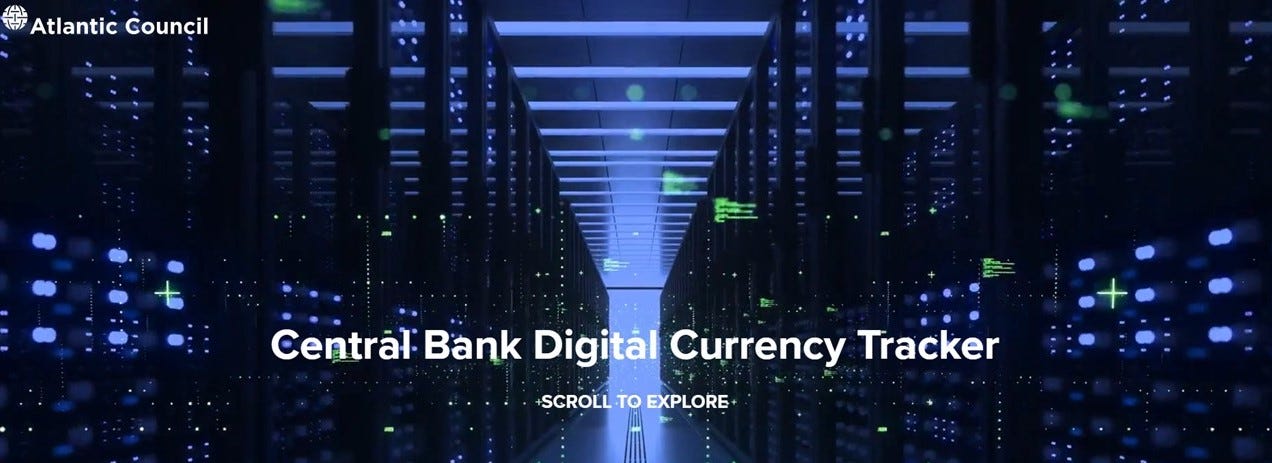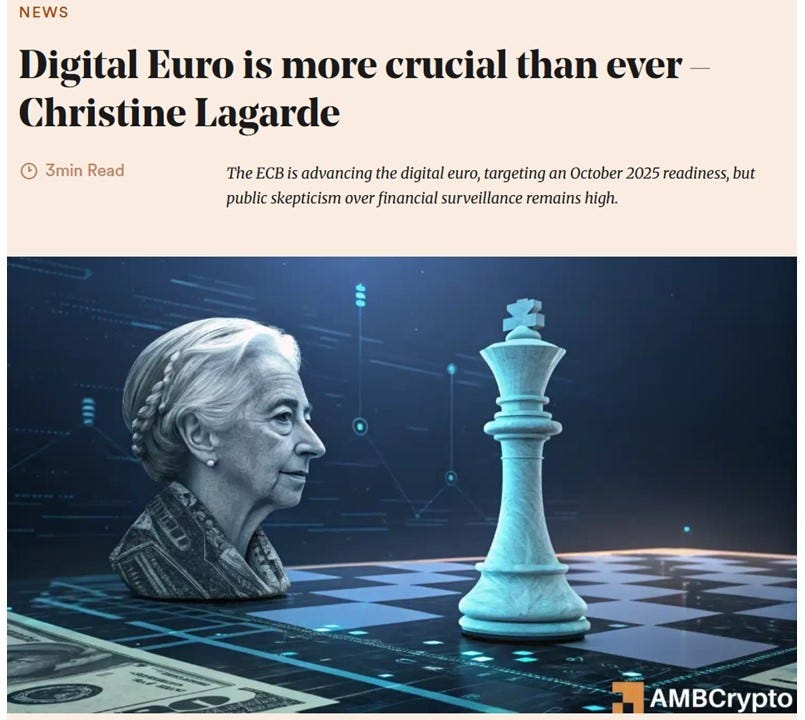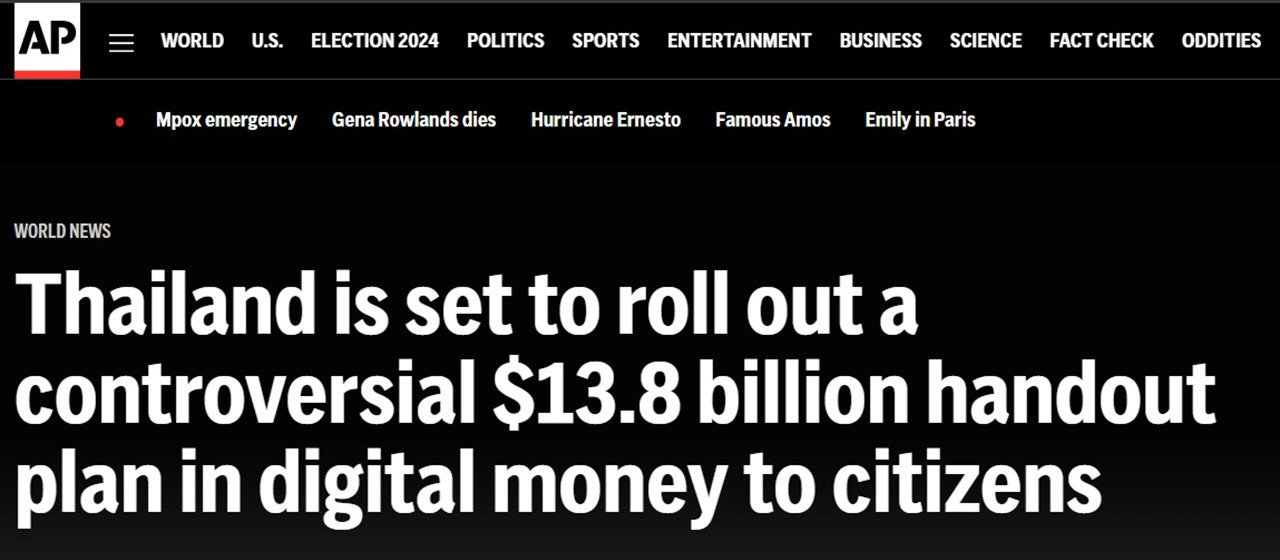This is the End Times Financial System They Want to Trap You In (Part 1 of 3)
Part 1: Central Bank Digital Currencies (CBDC)
The Book of Revelation describes an end times financial system often referred to as “the mark of the beast system”:
"He required everyone — small and great, rich and poor, free and slave — to be given a mark on the right hand or on the forehead. And no one could buy or sell anything without that mark, which was either the name of the beast or the number representing his name." Revelation 13:16-17 (NLT)
The construction of a system identical to the mark of the beast system in capability and function is underway right now. It’s primarily composed of three elements:
1) Central Bank Digital Currency (CBDC)
3) Digital IDs
In Part 1 of this series, we look at central bank digital currency (CBDC) – what it is, what’s happening right now (its current roll-out status), and why the public will buy into the idea they need it.
Make no mistake, this system is designed as a trap to enslave the people within it. And while I believe the rapture of the church will take place before the mark of the beast system appears during the Tribulation, the infrastructure for such a system is under construction right now. That means, as Christians, we may experience some or all of the elements of this system before we depart this world, so make sure you’re prepared.
What is Central Bank Digital Currency (CBDC)?
The first element in this tyrannical end times financial system is central bank digital currency (CBDC). CBDC is centralized, digital fiat currency. But unlike the government fiat currency of the past, CBDC is fully programmable.
This means central banks can manipulate it in real-time. They have the ability to raise and lower interest rates on your currency in real-time. They have the ability to put restrictions on your currency in real-time, such as where you can spend it and on what. In addition, with CBDC, the government has full insight into every financial transaction you make. And they also have full control over the currency itself, meaning they could cancel your ability to use it at any time.
What’s Happening Right Now?
As of February 2025, the Atlantic Council CBDC Tracker states, “134 countries & currency unions, representing 98% of global GDP, are exploring a CBDC."
Among those countries and currency unions are the nations of the European Union. In October, the European Central Bank has said it will roll out a digital euro:
"The European Central Bank (ECB) has set October 2025 as the deadline to launch its Central Bank Digital Current (CBDC). Bank president Christine Lagarde disclosed this at a press conference on March 6 when asked about Europe’s plan for a Digital Euro.
The question was whether Europe had a unique opportunity to gain pioneer status with its Digital Euro after President Donald Trump signed an executive order preventing the US Federal Reserve from creating a digital dollar.
Lagarde explained that the ECB has been working on the digital Euro for more than five years now, starting from her predecessor time, and the plan now is to finalize the work by October 2025. She added that Europe will proceed with the plan to introduce the digital Euro despite the US changing its stance on CBDC."
If you live in Europe, the situation looks bleak. CBDC will roll out to the public by the end of this year. Within a few short years, I anticipate it will be the only payment option available in the Eurozone.
And if you live elsewhere, the outlook is not much better. The United Arab Emirates plans to launch its CBDC in the 4th Quarter of this year (emphasis mine):
"The Central Bank of the UAE announced it will launch its Digital Dirham central bank digital currency (CBDC) in the fourth quarter of this year. That’s when it plans to launch the retail version of the CBDC, which will be treated as legal tender, requiring people to accept it for payment. The central bank also intends to use the CBDC for wholesale and cross border payment purposes."
Notice the bolded part of this quote – in the UAE, people will be required to accept CBDC. This means no opt out exists. The citizens of the UAE will be trapped in this system permanently once it rolls out. And we see similar control on its way in South Korea.
This month, South Korea launched the test phase of its CBDC, involving 100,000 consumers and seven major banks. The roll out involved various merchants, including convenience store chain 7-Eleven, Kyobo Book Centre, and delivery service Ddaenggyeoyo (emphasis mine):
"South Korea’s 7-Eleven stores will accept payments in the country’s central bank digital currency (CBDC) until June, as the retailer participates in the test phase of its CBDC project.
The convenience store chain will reportedly provide a 10% discount on all products paid for with CBDC during the test period...
Many stores will participate in South Korea’s CBDC testing phase, which runs from April 1 to June 30. The project also involves 100,000 participants who will be allowed to test payments using CBDC issued by the central bank."
Notice the 10% discount offered to customers for using CBDC. This will be a common incentive to roll out and normalize the use of CBDC.
No Country Will Escape for Long…
Meanwhile, those central banks who haven’t launched a CBDC yet continue to insist one isn’t coming. They say, “We don’t intend to launch one…” – even though we all know one is coming. Here’s what the Bank of England is saying (emphasis mine):
"The Bank of England is reluctantly pressing on with work to create a form of digital money accessible to the general public, as commercial banks risk failing to keep up with less-regulated tech firms, Governor Andrew Bailey said on Saturday.
Bailey's remarks build on his longstanding concerns that he does not want to see day-to-day payments or banking-type services shift to cryptocurrencies or services from tech companies that are less safe or private than banks.
The BoE and Britain's finance ministry have said they will not make a final decision before 2025 at the earliest whether to go ahead with a state-backed digital pound or central bank digital currency (CBDC), following a consultation which drew widespread concerns about privacy."
Notice the unnecessary use of the word “reluctantly” in the news story. Don’t think for a moment it wasn’t placed there intentionally. They want people to think they don’t really want a CBDC, but if they’re forced to implement one due to a lack of “financial innovation” in the private sector, well then – they’ll just have to do it anyway. Yeah, right. 🙄
Bailey’s “longstanding concerns” are really a loss of control by the Bank of England and the emergence of financial freedom for the nation’s citizens. He goes on to say a decision hasn’t been made on CBDC, but not long ago, the European Central Bank said the same thing. Now, they’re telling us a CBDC is coming in October.
The United States isn’t immune to this either. Despite President Trump’s executive order banning CBDC in the United States as well as Fed Chairman Jerome Powell’s insistence the U.S. won’t have a CBDC, the United States has been working on CBDC as well.
This work is a full-time endeavor for our family. Without the support of readers, viewers, and listeners like you, the work we do here would not be possible. If you like what you see, please consider becoming a paid subscriber.
As a paid subscriber, you’ll get weekly paid-subscriber videos and/or articles, a monthly live Q&A via Zoom, commenting privileges on every post, access to the complete archives, and more. Most of all, you get to support this work which spreads the Good News of Jesus Christ to tens of thousands of people in over 100 countries.
Point blank, Powell said the U.S. won’t have a CBDC as long as he’s chairman of the Federal Reserve:
“Can I have your commitment that as long as you’re the chairman of the Federal Reserve system that we will never have a central bank digital currency?” Sen. Bernie Moreno, R-Ohio, asked Powell during the chair’s semiannual testimony on monetary policy and regulation.
“Yes,” Powell responded.
So, that means no CBDC in the United States, right? Think again.
Back in March 2024, Powell testified before Congress and said the Fed was not even remotely close to issuing a central bank digital currency (emphasis mine):
“Testifying before Congress Thursday, Powell said policymakers were "nowhere near" taking action on adopting such a tool.
He added that the Fed has no interest in establishing accounts for individuals that would compete with the banking system, and it would not support any Fed monitoring of personal financial transactions.
"If we were to ever do something like this, and we’re a very long way from even thinking about it, we would do this through the banking system, the last thing...we the Federal Reserve would want would be to have individual accounts for all Americans," he said.”
According to Powell, in March 2024 the Federal Reserve was a “very long way from even thinking about” central bank digital currency.
Yet, less than a month later, the Federal Reserve Bank of New York issued a press release touting its participation in the Bank of International Settlements' Project Agora, an effort to study the use of CBDC in cross-border payments:
"The Federal Reserve Bank of New York's New York Innovation Center (NYIC) today announced that it will participate in an international technical research project that will explore whether the tokenization of central bank money and commercial bank deposits operating on a shared programmable ledger can improve wholesale cross-border payments.
Project Agorá, a new effort led by the Bank for International Settlements (BIS) Innovation Hub in partnership with the Institute of International Finance, will bring together seven central banks and financial institutions from each of their respective jurisdictions to research ways to increase the speed and transparency of international wholesale payments and lower associated costs and risks. The project will focus on overcoming common structural inefficiencies in cross-border payments today related to differing legal, regulatory, and technical requirements, operating hours and time zones, and varying financial integrity controls."
This was almost a year after the Federal Reserve Bank of New York issued a press release announcing its Phase I results for Project Cedar, "a multiphase research effort to develop a technical framework for a theoretical wholesale central bank digital currency":
"The Federal Reserve Bank of New York today issued a report on the Phase I results of Project Cedar, the inaugural project of its New York Innovation Center (NYIC). Project Cedar is a multiphase research effort to develop a technical framework for a theoretical wholesale central bank digital currency (wCBDC) in the Federal Reserve context through exploration of fundamental design choices and modular technical features.
Phase I of the Project Cedar experiment examined the potential application of distributed ledger technology, specifically blockchain, to enhance the functioning of cross-border payments. The 12-week experiment included the development of a wholesale CBDC prototype and revealed that wholesale cross-border digital currency transactions supported by blockchain technology can deliver fast and safe payments."
Does this sound like a “very long way from even thinking about” central bank digital currency?
Of course not.
So how can we really believe anything these people say?
CBDC is Coming…
Make no mistake, central bank digital currency is coming. And it’s coming to every country on earth. Central bankers in every country want it. The politicians want it. And most of the world's citizens are asleep.
As this European BearingPoint survey notes:
"The digital euro has achieved relatively high awareness, with only one-third of respondents having never heard of it. The situation is somewhat different for the central bank digital currencies (subsequently referred to as CBDCs) in Sweden, Denmark, and Switzerland. In these countries, four out of ten respondents are unfamiliar with CBDCs. Respondents primarily view the digital euro and the CBDC as a complement to existing payment methods."
At least a third of Europe's citizens don't even know what a CBDC is, yet they're set to have one in less than six months.
And among those who do know what it is, they think it will be "a complement to existing payment methods." It may be – for a short time. But after the digital euro achieves widespread adoption, other payment options will be eliminated. They'll ban cash, and all electronic payments will be CBDC.
All of Europe will be trapped in a system of digital tyranny.
In due time, the rest of the world will follow.
How Will the Public Be Sold On It?
And before you say, “Wait, Britt. People will never agree to that!” – just know this, people will demand it. As the BearingPoint survey notes, a good portion of the public doesn’t even know what a CBDC is, and among those who do, they don’t understand what it means. They don’t understand it’s a system of digital enslavement, and they hold the false belief it will be “a complement to existing payment methods.” Where does that belief come from? It comes from government and central bank assurances.
In other words, they believe the propaganda. And a public this ill-informed and easily misled will be highly susceptible to all the arguments in favor of CBDC. They’ll sell it to the public using these four methods:
Convenience
Incentives
Safety
Fear
1) Convenience and Cost Savings
According to the World Economic Forum (not surprisingly an advocate of CBDC), CBDCs can “cut transaction costs and times”:
"When migrants send money back to people in their home country, they face an average charge on the transaction of 6.25%, the World Bank says. This is hacking away at the remittances that provide critical support for developing economies.
CBDCs could reduce the costs of these cross-border transactions by removing the need for money transfer operators, the Bank for International Settlements (BIS) says.
CBDCs could also speed up cross-border transactions. International payments often take one or two days, but some can take five. With CBDCs, digital payments could happen within seconds at any time of day."
We see this same argument deployed for biometric payments. “You can save 17 seconds at checkout from not having to take out your credit card,” they claim. All that’s required is to give up complete privacy regarding your biometric data. But isn’t it worth it to save a few extra seconds a day with something like Amazon One Palm Pay?
2) Incentives
Think the public will be reluctant to use CBDC? Maybe so. But the government can quickly change that reluctance with incentives. The government will simply offer “free cash” to all those who sign up for a digital wallet. For example, in the United States, the government might say, “Sign up for your new digital wallet and $5,000 will be waiting for you.”
Think that will work? I assure you it will. And for those who hold out initially, they’ll just offer more. How about $25,000? Or $50,000? This offer will prove irresistible for the overwhelming majority of the public.
In fact, we already saw such incentives introduced in Thailand in 2024:
"Thailand's prime minister said Monday that eligible businesses and individuals can register from August for digital cash handouts, a controversial program that will cost billions of dollars and is meant to boost the lagging economy.
The government announced in April the widely criticized ambitious plan, named the Digital Wallet, meant to give 10,000 baht (about $275) to 50 million citizens in digital money to spend at local businesses.
The “Digital Wallet” was a major campaign promise of the ruling Srettha’s Pheu Thai party ahead of last year’s general election."
Of course, this “money” comes with strings attached, and those strings give the government the ability to control its citizens.
The Human Rights Foundation has its own CBDC tracker, and its entry for Thailand states the following:
"In July 2024, Thailand Prime Minister Srettha Thavisin announced that the government would soon use digital wallets to distribute 10,000 baht ($281) to Thai citizens over the age of 16 with incomes under 840,000 baht ($23,710) and savings under 500,000 baht ($14,072). For context, the average income in Bangkok was 468,600 baht ($13,222) in 2021. Applicants must verify their identity using both their national identification card and facial recognition.
Once approved, recipients are only allowed to spend the money within the districts listed on their identification cards, and they must do so within six months of receiving the money. Furthermore, recipients are not allowed to spend the money on lottery tickets, alcoholic beverages, tobacco products, cannabis, kratom, gift cards, cash cards, gold, diamonds, gems, oil, fuel, natural gas, electrical appliances, electronic devices, or communication devices. In fact, recipients are not even allowed to spend the money online, at department stores, or at large chain stores."
Notice all the restrictions. This programmability is a feature of central bank digital currency.
As noted, it can’t be spent outside of the designated district. It must be spent within a predetermined time period. And lest you think you can opt out of their digital tyranny by trading your CBDC for other forms of currency such as gold, gift cards, fuel, tobacco products, or anything else with tradable commodity value, think again. The CBDC can’t be used to purchase those things.
Once they eliminate all other forms of payment, they’ll probably relax those restrictions – but only for those who don’t “abuse the privilege.”
3) Safety
Another way they’ll sell the public on CBDC is through the promise of “safety.”
Currently, governments around the world are waging a war on cash, claiming it’s only used by terrorists, drug dealers, money launderers, and other criminals. Governments will claim, “With CBDCs, we’ll be able to apprehend these criminals and keep you safe.” Of course, this assumes CBDC will become the only payment option and cash will be eliminated.
They’ll also claim, “We have a 21st Century financial system, but antiquated 20th Century financial regulations. In order to keep pace with a fast-changing world of innovation, we need 21st Century financial regulations for a 21st Century financial system.”
During the 2023 banking crisis, I put together a video explaining how they'll use this line of reasoning as an excuse to claim CBDC is an absolute necessity:
As outlined in my article, “How the Current Global Financial Crisis Leads to Biblical Tyranny (in 10 Steps)”, this stated need for “21st Century financial regulations” will come to the forefront of public discussion during the acute phase of next financial crisis. When financial panic reigns supreme, the governments and central banks of the world will go into full-court press propaganda mode, using fear to sell CBDC as “the solution” to the problem they ultimately created.
4) Fear
When global markets ultimately collapse under the weight of unprecedented debt and a $1 to $4 quadrillion derivatives complex, we’re likely to see "The Great Taking" by David Rogers Webb play out in the real world. Customer assets will be used to bail out and save the financial system, and millions of people will potentially lose the stocks, bonds, and other assets in their brokerage and retirement accounts.
Once the global financial system breaks, “the solution” will be conveniently “found” waiting in the wings. As noted, they’re already preparing and testing it now. All that’s necessary is the proper crisis to drive its final implementation.
With a panicked public facing the loss of their life savings, governments and central banks will promise two things:
1) We’ll restore all of your financial assets, and
2) We’ll make sure this never happens again
Only one catch… For those two things to happen, they’ll need full adoption of CBDC.
Bank deposits lost to bank bail-ins will be restored with central bank digital currency.
Assets lost in 401(k)s and other brokerage accounts will be restored with the cash equivalent of central bank digital currency.
What do you think the public will choose? Lose my life savings forever or have it replaced in the form of central bank digital currency? I believe the answer is clear.
“Adopt CBDC,” governments and central bankers will say, “and we’ll make sure this never happens again.”
They’ll claim CBDC will give regulators much needed insight into the “shadow banking system” and systemically important non-bank financial institutions (entities that don’t currently fall under the same regulatory standards as banks). And with this new oversight, such a crisis will “never happen again.”
Will governments and central banks take responsibility for the financial meltdown – one created by their decades of terrible policies and mismanagement? Of course not. They’ll assign blame to “bad actors.”
Rogue speculators… Risky hedge funds… Fraudsters and Ponzi scheme operators…
They’ll blame all the “bad actors” (with the exception of themselves), and they’ll claim CBDC will enable law enforcement to identify such criminals instantly.
For example, during the Great Financial Crisis, the world became aware of Bernie Madoff – notorious facilitator of the greatest Ponzi scheme in history. It’s almost certain we’ll see a similar scheme uncovered in the next crisis.
“We could have stopped this,” they’ll say. “With CBDC, we could have known in real-time the fraud operator had misallocated funds. We would have seen investors send him their money, and we would have seen him use it to buy yachts and mansions rather than stocks and bonds.”
In doing so, they’ll claim CBDC is necessary to prevent another crisis like the one that just unfolded. Ultimately, the public will embrace CBDC as a “safeguard” against future financial crises.
But it’s an empty promise.
CBDCs will give the government centralized, programmable control, and insight into half of all transactions in the economy.
In Part 2 of this series, we talk about the scheme that will give them the remaining centralized control and insight into every economic transaction – tokenized assets.
As mentioned previously, Christians may experience some or all of the elements of this oppressive financial system rollout before we depart this world. So make sure you’re prepared for the Great Reset and a bank holiday.
If you liked reading this, please click the ❤️ button on this post so more people can discover it on Substack 🙏 or share it with your loved ones and spread the Good News that Jesus is coming!









GREAT article. Wow! Will be very interested to see the next part. My eyes are wide open and fixed on Jesus.
Fantastic, well written, detailed, thoroughly researched article. As always you've knocked it out of the park, Britt. It is alarming but you connect the dots in ways I can understand. Thank you for your work. God bless you 🙏